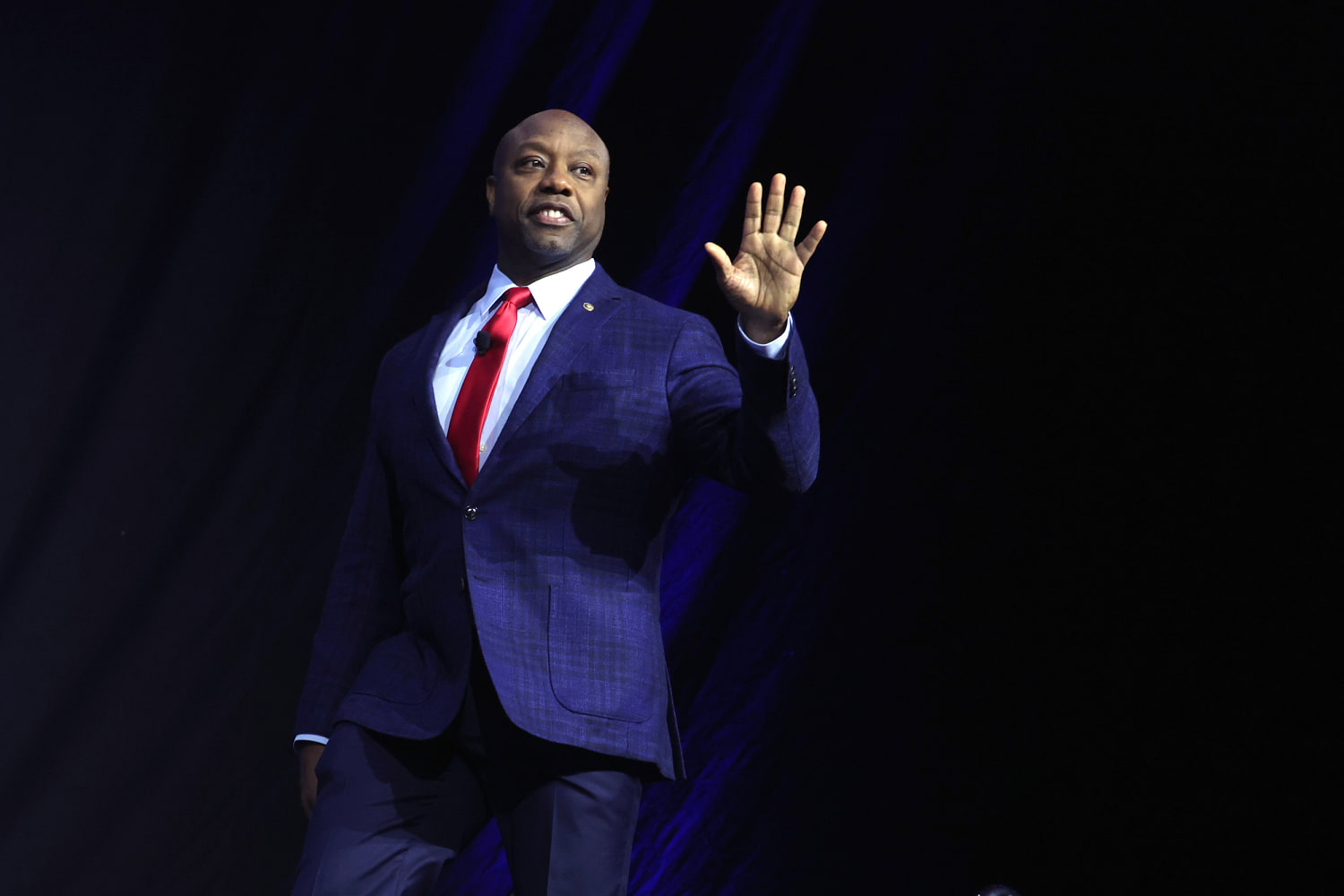Tim Scott focuses on his pitch to Black voters amid Trump VP speculation


Last July, a town hall attendee in Salem, New Hampshire, asked Sen. Tim Scott if he “believed he could swing the historically Democratic-supporting African American community.” Scott’s response was guarded.
“Maybe,” the then-presidential candidate replied. “I’m a fairly conservative candidate. That does not necessarily bode well for my ability to persuade die-hard Democrats, Black or white or any other color.”
But now, with Scott in the middle of speculation about former President Donald Trump’s pick for a 2024 running mate, the South Carolina senator is leaning into his ability to engage with the growing number of Black voters that polling data suggest are open to voting for Trump in this election.
Scott has launched a weekly series, “America’s Starting Five,” with other Black Republicans in Congress, in a bid both to make Black conservatives more visible and to reach Black voters. The series, which will discuss “politics, race, and the 2024 election” and which Scott hopes to continue at least through the summer, is also a vehicle for him to lean into a skill set that could be an asset for Trump: his perceived ability to expand the party’s tent.
“Sen. Scott recognizes that he can draw people into the party, particularly Black men,” said a source familiar with the planning of the series. “This is an effort to highlight that.”
A composite analysis of NBC polling data from 2023 found that among Black voters, men under 50 years old gave by far the lowest ratings to President Joe Biden — and the highest ones to Trump, though a majority still viewed Trump negatively.
Still, almost 40% of those voters said they’d vote for Trump over Biden in a general election, compared to no more than 15% in any of the other age and gender categories among Black voters, a split well outside the margin of error for those subgroups.
That’s largely what’s behind other recent surveys showing Trump garnering more support from Black voters than ever, cutting into Biden by double digits compared to the 2020 results, even though the president still leads among Black voters.
A shift in tone
Scott’s willingness to focus on his race is a departure from the early days of his presidential campaign, when he was at times hesitant to lean too deeply into his identity, even as supporters encouraged him to highlight a factor they believed made him the most electable 2024 presidential candidate on the GOP side.
“Here are four non-Black, Black people,” Scott said while leading a roundtable discussion alongside four other prominent Black Republicans in the first episode of his new series: Reps. Burgess Owens of Utah, Byron Donalds of Florida, John James of Michigan and Wesley Hunt of Texas.
The panelists were taking their turns dissecting a past misstep by Biden, and the focus of the group had turned to a 2020 interview he did with radio host Charlamagne tha God, during which Biden suggested that Black Americans who don’t vote for him “ain’t really Black.”
“The good news is in 2024, it looks like four out of 10 of us ain’t Black enough for Joe Biden,” Scott continued.
As Scott’s presidential campaign went on last year before he dropped out in November, his tune began to shift. He became more vocal not only about his appeal to the small but growing number of Black conservatives nationwide, but also how he was uniquely positioned to help the party make more inroads with voters of color, as arguably the most prominent Black Republican elected official in the country.
“I believe that I create a red wave where we win back the Senate, we expand our majority in the House, and you do that by having the kind of candidate who — the literal truth of my life — destroys the lies of the radical left and creates a red wave,” Scott said at one of his final campaign stops in October.
That “red wave,” in his view, would be fueled in part by his life story: A Black man from South Carolina, raised by a single mother in a low-income neighborhood, who went from “cotton to Congress” in a single generation, as he often riffed during his events.
“I have lived a similar experience to people who find themselves trapped in poverty, who are today growing up in single parent households, who are wondering whether the American dream can work for them,” Scott said.
A valuable surrogate
Trump seems aware of Scott’s potential and has certainly worked to keep his former primary opponent close.
In addition to appearing alongside Trump at several campaign rallies in the waning days of the Republican primary, Scott was invited by Trump to attend and speak at his Mar-a-Lago fundraiser last week, which the campaign said netted $50 million across groups including Trump’s main super PAC and other fundraising committees.
A day before the South Carolina Republican primary, Scott accompanied Trump to the Black Conservative Federation’s annual gala, where Trump was the recipient of the “Champion of Black America” award. Scott was the only former Trump rival to appear at the event.
And Trump has repeatedly said that Scott is better at campaigning on his behalf than he was campaigning for himself.
The Biden-Harris campaign appears skeptical that Scott — or whoever Trump ultimately selects as a running mate — will be successful in recruiting more Black voters to the Republican Party.
“Regardless of who Donald Trump’s running mate is, these are the facts: While he was president, Black unemployment and uninsured rates spiked, his encouragement of white nationalism divided the nation, and his botched Covid-19 response disproportionately left Black people dead,” said Jasmine Harris, the Biden campaign’s Black media director. “Black voters remain some of the most informed and engaged voters every election, and this November they will get behind Joe Biden and Kamala Harris, who put Black Americans at the forefront of their administration’s work.”







